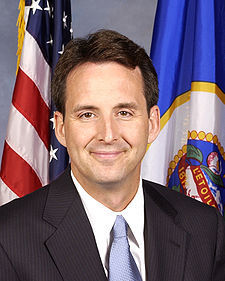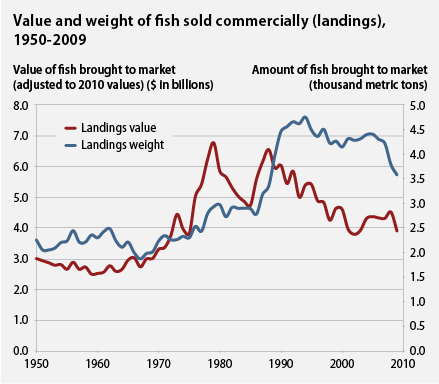Matthew Yglesias's Blog, page 2389
March 15, 2011
India Fact of the Day

From Charles Kenny's Getting Better:
In India, the percentage of parents who think the correct treatment for a child with diarrhea is to reduce the amount they are given to drink (absolutely the wrong thing to do) varies considerably from state to state. Fewer than 5 percent give this wrong answer in states like Kerala, where we have seen that health outcomes are very strong. Above 50 percent suggest this response in West Bengal—where child mortality in the 1990s was about three times as high as in Kerala.
I assume something similar happens in the US context. Literate people with Internet access and the knowledge that the Mayo Clinic's website is a font of credible personal health information have a substantial edge over those lacking those things, health-wise.


Sendai in Perspective
Something to note is that it seems that no natural disaster in the history of the United States of America has killed as many people as the earthquake/tsunami that's hit Japan, and that's completely before accounting for any longer-term impacts of radiation.


Remnick on Obama and Palestine

Yaakov Shimshon Shapira
This is exactly right in my view:
One of the myths of Israeli history is that only a few intellectuals on the left could see, in the wake of the 1967 war, that a prolonged occupation of Palestinian lands would be a moral and political calamity. In fact, records of the first cabinet meeting after the war show that the Justice Minister, Yaakov Shimshon Shapira, said, "In a time of decolonization in the whole world can we consider an area in which mainly Arabs live, and we control defense and foreign policy? . . . Who's going to accept that?"
Ultimately, no one. If America is to be a useful friend, it owes clarity to Israel, no less than Israel and the world owe justice—and a nation—to the Palestinian people.
Not much more to say about this.


Crisis Deepens in Japan
I'm going to be traveling for the bulk of today and won't be able to keep up with the latest developments in Japan, but as of this morning the nuclear situation has darkened considerably from where it was eighteen hours ago. The Union of Concerned Scientists' All Things Nuclear blog is a useful source of informed information, including the fact that the level of radiation leakage happening at Fukushima considerably exceeds the design limitations imposed by the American Nuclear Regulatory Commission. The NRC itself also apparently has a blog where they're doing updates that may be of interest.
One of my neighbors is an NRC seismologist, as it happens, and they have a fact sheet on seismic issues and American nuclear reactors that may be of interest. Earthquakes, obviously, are quite rare in the US outside the West Coast, but as the factsheet indicates they have happened on occasion and "in 1811–1812, three major earthquakes (Magnitude 7 to 7.7 on the commonly used Richter Scale) shook much of the [Central and Eastern United States]." My read of that is that nuclear power plants may be some of the only infrastructure in this part of the country that actually has been designed with earthquake resiliency in mind.


The Murky Economics Of Catastrophe
My colleague Brad Johnson talks to Lord Nicholas Stern who tells him that the relatively optimistic forecasts from the Congressional Budget Office about the economic consequences of climate change are "ludicrous":
I try, personally, not to get too invested in this kind of controversy because I think it sort of misses the point. Expenditures on cleanup of radiation count as GDP. So by the same token, if Manhattan becomes uninhabitable and we need to build new buildings for everyone to live in, that will be GDP. The economic point would be that GDP measures flow of goods and service while ecological devastation impacts our stock of said things. And, again, grandma dying of heatstroke is not a problem for the national economy. Grandma's retired. Grandma's not producing goods and services. But you love her and so does your dad and your cousin.
Then the other thing that's a little mysterious about the economisty discussion around this subject is that I see no particular reason to think that smart clean energy policies would cost anything at all. A tax on greenhouse gas emissions is a very growth-friendly source of revenue, even leaving the ecological impacts aside. There is, I suppose, some possible level of carbon tax at which this abstruse debate about the macroeconomic impact of a 6°C (11°F) warming becomes a relevant policy consideration, but you'd have to be talking about a very different political atmosphere.


March 14, 2011
Endgame
Walk without rhythm and it won't attract the worm:
— 42 percent of millionaires don't feel wealthy.
— 100 percent of poor people don't feel wealthy.
— Coal ash is more radioactive than nuclear waste.
— The real NIMBY problem.
— Bloomingdale "plagued" by popular coffee shop.
— Why Rep Michael Grimm is making John Boehner smile.
— Why Dune is motherf—ing awesome (and also here, here, andhere).
I only recently realized that Fatboy Slim's "Weapon of Choice" is about Dune.


Life In Germany
Many jobs require such degrees in Germany, where, as is not the case in America, calling oneself doctor for having completed a thesis in, say, political science or art history, is not embarrassing but normal, even when filling out Lufthansa's online booking forms. (The airline generously provides three levels of academic achievement for its overachieving countrymen: doctor, professor and professor doctor, skipping the extremely rare but not unheard-of German mouthful Herr Professor Doctor Doctor).
I keep hoping universities will start handing out degrees in blogging so I can get myself a cushy professoring gig.


Whatever Happened To Tim Pawlenty, The Sam's Club Republican Of Tomorrow?

While reading Jeff Zeleny's account of Tim Pawlenty's efforts to position himself as the generic orthodox Republican I couldn't help but be reminded of the article that put Pawlenty on my radar screen. That, of course, was the 2005 joint from Reihan Salam and Ross Douthat that jumped off Pawlenty's vacuous injunction that Republicans should be "the party of Sam's Club, not just the country club" to argue for a conservatism focused on working class economic concerns:
The third possibility–and the best, both for the party and the country as a whole–would be to take the "big-government conservatism" vision that George W. Bush and Karl Rove have hinted at but failed to develop, and give it coherence and sustainability. This wouldn't mean an abandonment of small-government objectives, but it would mean recognizing that these objectives–individual initiative, social mobility, economic freedom–seem to be slipping away from many less-well-off Americans, and that serving the interests of these voters means talking about economic insecurity as well as about self-reliance. It would mean recognizing that you can't have an "ownership society" in a nation where too many Americans owe far more than they own. It would mean matching the culture war rhetoric of family values with an economic policy that places the two-parent family–the institution best capable of providing cultural stability and economic security–at the heart of the GOP agenda.
The piece even offers a shout out to Mitt Romney's health care thinking as an important step in the right direction.
At any rate, I think it's telling that not only has Pawlenty failed to live up to this aspiration of innovative thinking, but the general trend in conservative politics has been to simply ratchet up the Bush/Rove incoherence. Instead of cutting taxes without offsetting tax cuts, the new thing to do is to insist very loudly that spending must be cut immediately while simultaneously positioning yourself as the one true defender of Medicare. It's a very different political style and mood from what prevailed five years ago, but it reflects the exact same tension Ross and Reihan were writing about then. There's a disjuncture between the funding base of a movement focused on rich people's tax rates and the voting base of a party relying on older working class white people for the bulk of the votes.


Conservatives Against Markets
My colleague Michael Conathan writes about the problem of declining fish stocks:

I'm not very knowledgeable about this subject, but one idea that comes to mind pretty obviously is some kind of property rights in the fish. Tradable permits that would create incentives to conserve. Right now, you own a fish if you've caught it, but nobody owns it if it's in the ocean, so the incentives all pont toward overfishing. But according to Conathan, House Republicans are against this idea:
Something must be done. But what? Some groups, including NMFS, have begun touting a cap-and-trade style management system known as "catch shares" as a cure for the industry's ills. Under this system the total amount of fish available is divided and doled out to fishermen by percentages based on their catch histories, providing an ownership incentive to protect the long-term health of the resource.
Such a framework, though, often comes with more questions than answers. And in fact the House of Representatives passed an amendment to its recent spending bill for fiscal year 2011, filed by Rep. Walter Jones (R-NC), that would prevent any federal funding from being used to develop new catch share programs.
The mainstream view on the American right is, I guess, that it's just not conceivable to do anything at all to try to prevent depletion of natural resources.


Former Senator Evan Bayh To Pair Lobbying With Conservative Television Punditry

History's Greatest Monster
When he first announced that he was stepping down from the United States Senate, Evan Bayh cited a lot of high-minded reasons for the decision. So high-minded was his talk that Ezra Klein was moved to remark that "Evan Bayh might have been an ordinary politician, but he's proving an extraordinary retiree." It turned out, however, that his main plan was to get rich as a lobbyist. Today we learn that he'll also be acquiring a secondary gig as a conservative television pundit:
Bayh will be a commentator and political analyst across all of Fox News' platforms. He was a Senator from 1999 to 2011, where he became one of the more prominent conservative Democrats in the chamber. He was also the Governor of Indiana from 1989 to 1997. Bayh considered running for the presidency in 2008, but ultimately decided against it.
Note that there's considerable synergy between Bayh's job at McGuireWoods LLP and his Fox gig. This way business enterprises hoping for regulatory favors or subsidies from the federal government can hire McGuireWoods not only to take advantage of Bayh's influence and knowledge on the Hill, they'll also be gaining on on-air television spokesman, presumably one whose client affiliations won't be disclosed to the viewing public. And since as best we can tell Fox has no journalistic standards, it'll be an ideal venue for peddling whatever nonsense he likes.


Matthew Yglesias's Blog
- Matthew Yglesias's profile
- 72 followers



